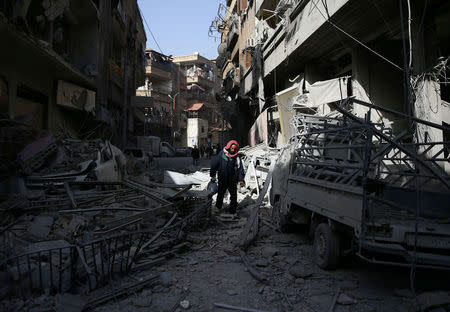Russia and U.S. air strikes caused mass civilian deaths in Syria: U.N.
By Stephanie Nebehay GENEVA (Reuters) - Air strikes by Russia and a U.S.-led coalition killed civilians in Syria on a large scale last year, while the Assad government carried out unlawful chemical weapon attacks in rebel-held eastern Ghouta, U.N. war crimes investigators said on Tuesday. Islamic State fighters and other insurgent groups committed war crimes including deadly attacks on civilians and using them as human shields, the investigators said in their latest report covering six months through January 15. Paulo Pinheiro, chairman of the U.N. Commission of Inquiry on Syria, said that it came at a "very dark moment in this conflict" as fighting intensifies in Idlib, Afrin and Ghouta. But the panel was "not a tribunal" and had no powers to take its investigations further, he told a news conference. During the period, "victims of the Syrian conflict have suffered greatly as violence countrywide re-escalated to new heights," the report said. "(Syrian) government forces continued to use chemical weapons against armed group fighters in eastern Ghouta," it said. Among other key findings, the panel said that an air strike by a "Russian fixed-wing aircraft" using unguided weapons last November hit a market killing at least 84 people and injuring 150 in Atareb, west of Aleppo, in a "de-escalation zone" declared by Russia, Iran and Turkey. It found no evidence that the Russian strike had deliberately targeted the market, but said "this attack may amount to the war crime of launching indiscriminate attacks resulting in death and injury to civilians", the first time it has explicitly implicated Moscow in possible war crimes. "We have been looking at aerial bombardments for quite a while now, that the Russian air force as well as the Syrian air force have been involved in where there have been heavy civilian casualties," said panel member Hanny Megally. "But this is the first incident where we have been able to nail it down to a particular Russian plane and be able to investigate on the ground what took place," he added. Pinheiro, commenting on the Russian strike, said that under international humanitarian law, using certain weapons in civilian areas automatically amounts to the war crime of launching indiscriminate attacks because of the nature of the weapons used. And three U.S.-led coalition strikes on a school near Raqqa in March 2017 killed 150 residents - roughly five times the toll acknowledged by the Pentagon, which said at the time that dozens of militants and not civilians were killed. The U.N. investigators found no evidence that Islamic State fighters were at the school and said the U.S.-led coalition had violated international law by failing in its duty to protect displaced civilians known to be sheltered there since 2012. "We did not find any indication that the attack was intended to hit either civilians or a civilian building but that the U.S. forces had enough time and resources available, that they should have been able to take additional precautions that may have led to the air strike being called off or delayed," Pinheiro said. Megally said: "As with the (U.S.-led) coalition that has been pressed to investigate, the Russian authorities also ought to be investigating now that we brought this to light and present their findings." The independent investigators called on all sides to allow access to besieged areas and all detainees. Justice must be served in any peace deal ending the conflict soon entering its eighth year, they said. The report is based on 500 confidential interviews conducted with victims and witnesses abroad or in Syria via social media. The Assad government has never let the team into the country. "Humanitarian aid has been instrumentalized as a weapon of war with siege warfare and denial of life-giving assistance used to compel civilian communities and parties to the conflict alike to surrender or starve," it said. Syrian government forces used chemical weapons against insurgents in eastern Ghouta, including chlorine three times in July, and in Harasta on the western edge of the zone in November, the report said. The U.N. investigators had previously documented 33 chemical weapons attacks in Syria. The Syrian government has denied using chemical weapons, saying it surrendered its stockpiles after signing the global ban in 2013. "NO PARDONS OR AMNESTIES" The multi-sided Syrian civil war has killed hundreds of thousands of people and driven at least 11 million from their homes. Neighboring countries and global powers have entered the conflict, backing allied forces on the ground. The United States joined the war in 2014, leading an international coalition carrying out air strikes against Islamic State fighters in both Syria and Iraq, who were largely defeated last year. Russia joined the conflict in 2015, providing air and ground support for its allies in the Syrian government. The U.N. investigators, noting that efforts for the U.N. Security Council to refer Syria to the International Criminal Court (ICC) have stalled, due to Russian vetoes, welcomed national jurisdictions taking up more cases including against foreign fighters. Victims must be helped to obtain justice, which should be a "central component" of any negotiated settlement ending the war, they said. There must be "no pardons or amnesties for those responsible for ordering or carrying out gross human rights violations and committing international crimes such as war crimes, crimes against humanity or genocide". (Reporting by Stephanie Nebehay; Editing by Matthew Mpoke Bigg)


